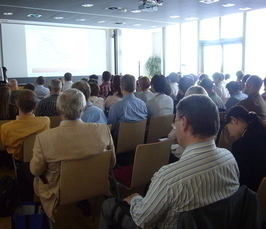ENTFÄLLT: MPI Kolloquiumsreihe: Prof. Dr. Christoph Wittmann, Systems metabolic engineering of industrial microorganisms
MPI Kolloquiumsreihe: Prof. Dr. Christoph Wittmann, Systems metabolic engineering of industrial microorganisms
- Datum: 21.11.2019
- Uhrzeit: 16:00 - 17:00
- Vortragende(r): Prof. Dr. Christoph Wittmann
- Institut für Systembiotechnologie, Universität des Saarlandes
- Ort: Max-Planck-Institut Magdeburg
- Raum: Großer Seminarraum "Prigogine"
- Kontakt: sek-bpe@mpi-magdeburg.mpg.de

Leider entfällt dieser Kolloquiumsvortrag (Stand 28. Oktober 2019.)
Das Max-Planck-Institut Magdeburg lädt Sie herzlich zu seiner öffentlichen Kolloquiumsreihe ein. Hochrangige WissenschaftlerInnen verschiedener Fachgebiete aus renommierten Forschungseinrichtungen aus Deutschland und weltweit präsentieren ihre Forschungsarbeit.
Systems metabolic engineering of industrial microorganisms
Superior microorganisms that produce chemicals, materials, and fuels from renewables are major drivers of the developing bio-based economy. First, they hold the key to the optimized production of traditional bio-based products regarding key performance indicators such as titer, yield and productivity. Second, they enable future production of important chemicals from green resources rather than from fossil fuels. Systems metabolic engineering is changing the way to design and optimize microbial cell factories for industrial production: the integration of systems biology with new concepts from synthetic biology enables global analysis and engineering of the underlying complex metabolic and regulatory networks and bioprocesses at an efficiency and versatility otherwise not accessible. Meanwhile, model-based metabolic design and engineering can breed synthetic strains, which reach the high performance of classical producers derived over the past decades. This lecture will highlight the development of cell factories and bioprocesses for bio-production of industrial chemicals and materials. In addition, it will present novel approaches that extend the raw material basis to third generation renewables towards a sustainable green chemistry.